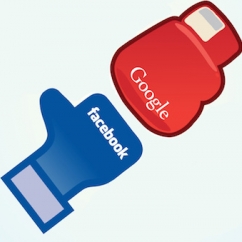Articles and News
Should Luxury Jewelers Use Google AdWords Or Facebook Audience Targeting? | September 09, 2015 (0 comments)

Totowa, NJ—Recently I was asked to explain the difference between ad targeting on Facebook and Google AdWords. In simple terms, AdWords can target what people are searching for, while Facebook targets the demographics of the people themselves. Let me dive a little deeper:
Google AdWords Keyword Targeting. Adwords allows for really good keyword targeting. That's their power, if you are willing to pursue it. It all starts with a selection of keywords you want to bid on. Here's a short set of example keywords:
- diamond bracelet
- antique engagement rings
- vintage engagement rings
- engagement rings
- diamond earrings
- jewelry stores
The default AdWords functionality is just like any other ad method, in that you pay big bucks to get in front of everybody, hoping that 1 in 1000 will buy. That's what I call the numbers game... The more people who see the ad, the faster you can get all types of clients. As business owners, we all believe that we can allocate a large advertising budget to bring all types of customers in quickly. Also, when we as business owners commit to spending large ad budgets, we also have a tendency to accept any type of customer our ads attract, even the annoying crappy customers.
I've seen plenty of poorly designed ads that attracted the wrong type of customers to a jeweler. The jewelers willingly accept those poor quality clients simply to break even on the ad cost, but it's the wrong strategy because the ad was wrong.
As a jeweler, you might think that the keywords I listed above are perfect for your AdWords targeting, but by default Google AdWords will use additional, really poor permutations of those phrases. Here are specific examples:
- When you tell AdWords to target diamond bracelet they also include art deco diamond bracelets.
- When you tell AdWords to target antique engagement rings, they also include antique filigree engagement rings.
- When you tell AdWords to target vintage engagement rings, they also include garnet ring and amazon engagement rings.
- When you tell AdWords to target engagement rings, they also include affordable engagement rings.
- When you tell AdWords to target diamond earrings, they also include 4 ctw diamond earrings.
- When you tell AdWords to target jewelry stores, they also include Canadian jewelry stores even if you don't live in Canada.
The cost of Google AdWords quickly gets out of control as all these odd permutations are automatically added to your keyword list without your permission. That's how it works. But you can prevent this from happening when you take the time to fine tune your keyword targeting with negative keywords and by giving AdWords additional instructions about keyword matching. If you're slightly familiar with AdWords you might recognize when I say broad, phrase, and exact match types that provide this control.
If you put in the extra time to build your keyword list, you will only attract the attention of the higher paying customers. This pulls you out of the proverbial numbers game because now you are targeting very specific sets of keywords. The drawback of this method is that it appears to work very slowly, and you might go days without calls from new customers. However, when customers do come calling, they are typically much higher sales.
As a business owner, I understand the mentality that you should be given the chance to talk to every potential customer, and try to make a sale, even a poor-quality customer. This keyword targeting technology allows us to sit back and wait for the right customers to contact us, freeing up all that wasted time you would spend on poor quality customers. This slower process usually frustrates all business owners, not just jewelers. You just need to trust the system until you reap the rewards—with less stress.
Facebook Customer Targeting. There's no way Facebook could compete with the power of Google AdWords targeting, so they didn't even try. But they have better access to demographic data that Google doesn't yet have. Facebook is able to determine a lot about every one of us based on how we interact with people and companies through their social network. They then allow advertisers to target those demographics. This is what makes it an ideal choice for a luxury jeweler who does need a higher-income customer.
Facebook’s targeting doesn't take as long to set up. It's as simple as telling them you only want to target people who make $100k every year in a zip code. You can add further qualifications, such as age and occupation, to help narrow down the affluent demographic you seek, but be careful how far you go. Even tighter targeting, such as “those who like luxury brands,” sounds like it would be a good qualification, but it can create a very tight limiting factor that is likely below the minimum Facebook audience threshold of 1,000.
Conclusions. It's much easier to have a few settings in Facebook for ad targeting than to sift through a list of hundreds of poor keyword permutations that Google added without your permission. It might take 30 minutes to set up Facebook customer audience targeting, but it takes many months of AdWords spending before your keywords are properly tweaked.
You can start paying for inexpensive Facebook ads within a few hours, but you'll have to spend a lot of money over several months before your AdWords is working correctly. When it comes time to seriously consider AdWords you need to allow yourself a "test budget" for the first few months until your keywords are fully organized.
Top image: idisrupted.com

Matthew Perosi has been a professional web developer since 1994. He is founder and president of jWAG (Jeweler Website Advisory Group) and Jeweler Websites Inc. After six years of monitoring web traffic, trends, and data while helping jewelers build their sites, he created jWAG to help all jewelers benefit from what he and his colleagues learned. Perosi is a frequent speaker at industry events and you can subscribe to his Daily Nugget Blog here.







